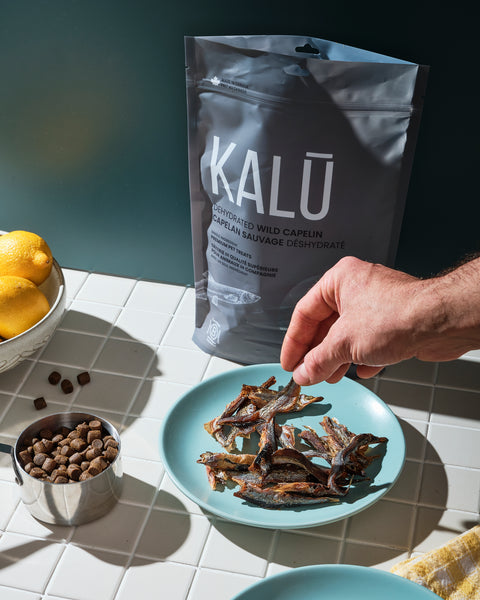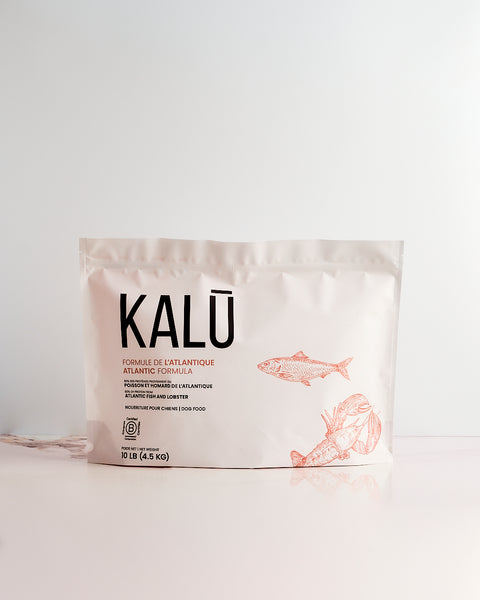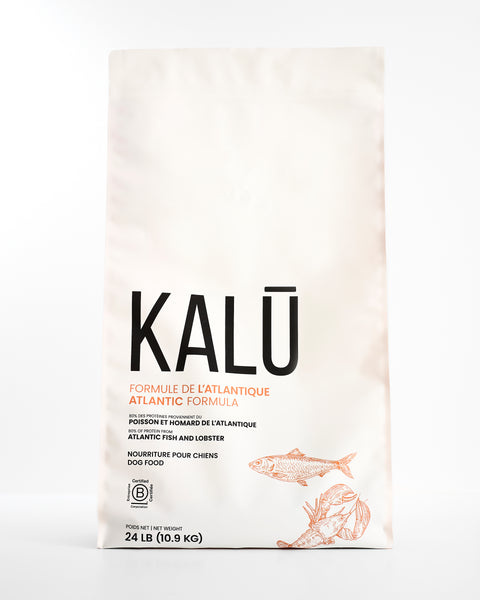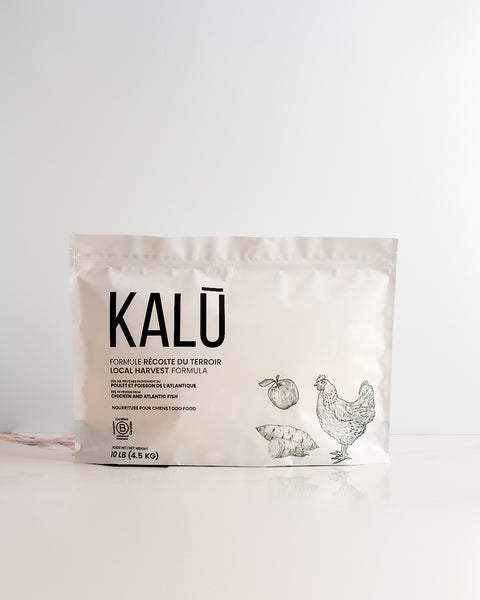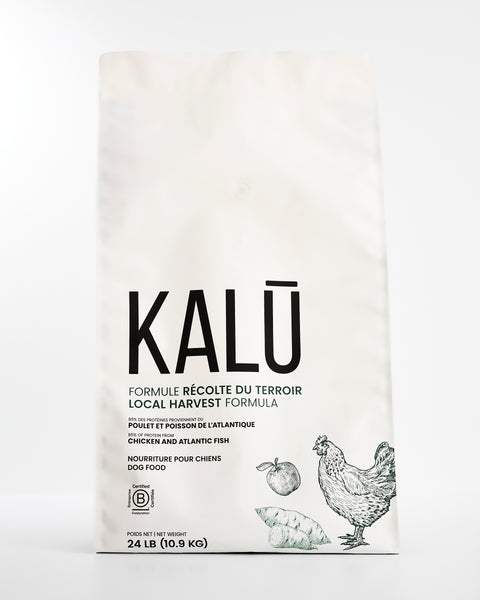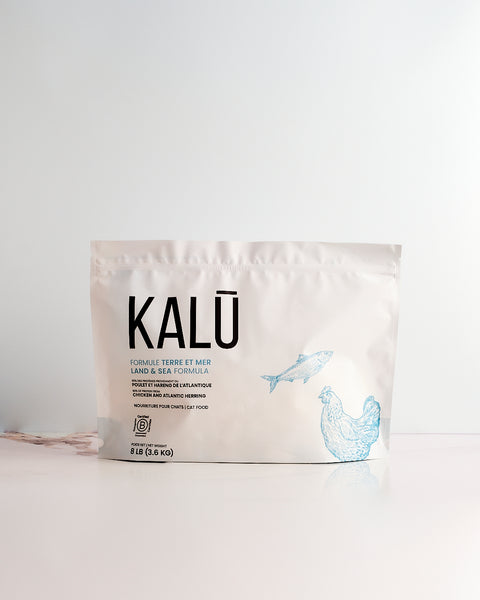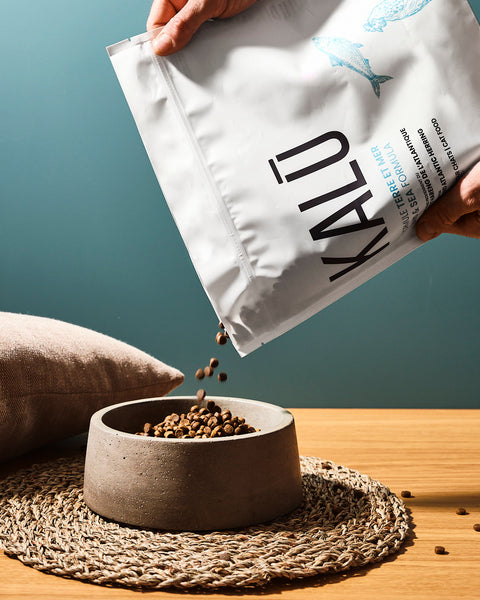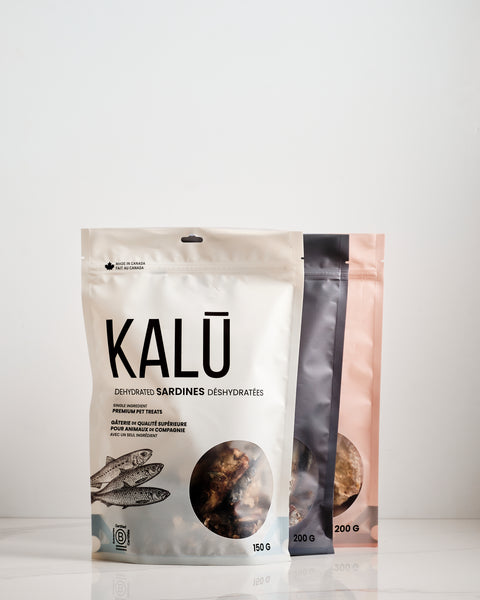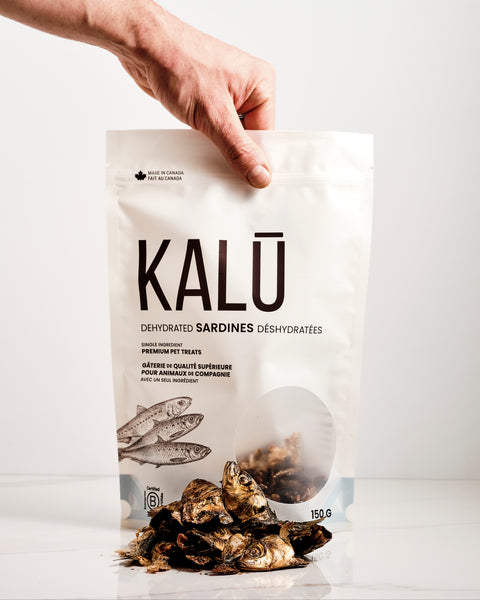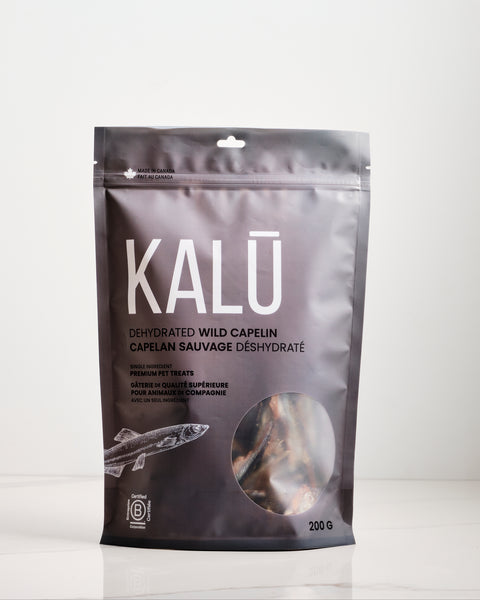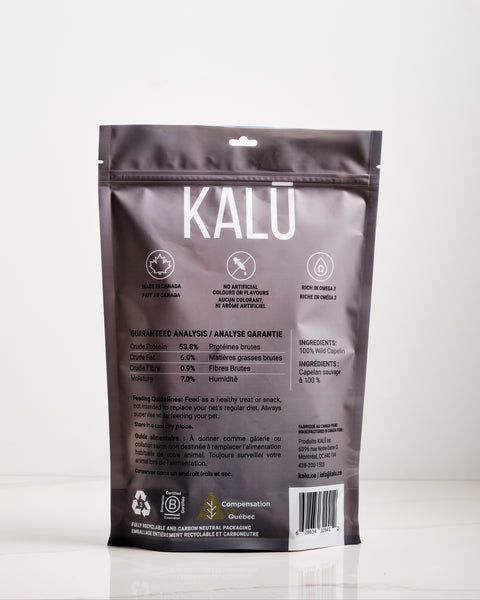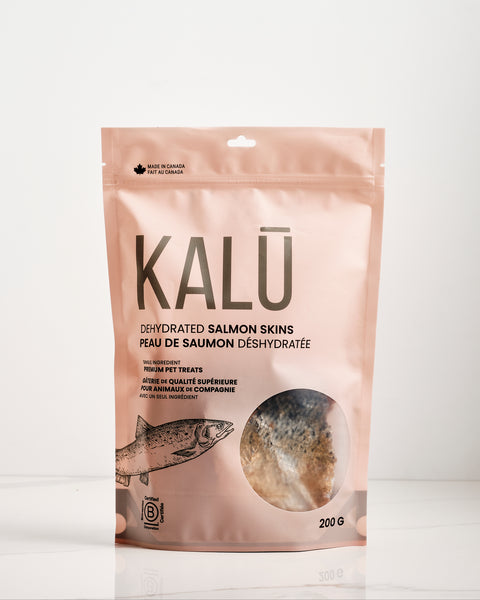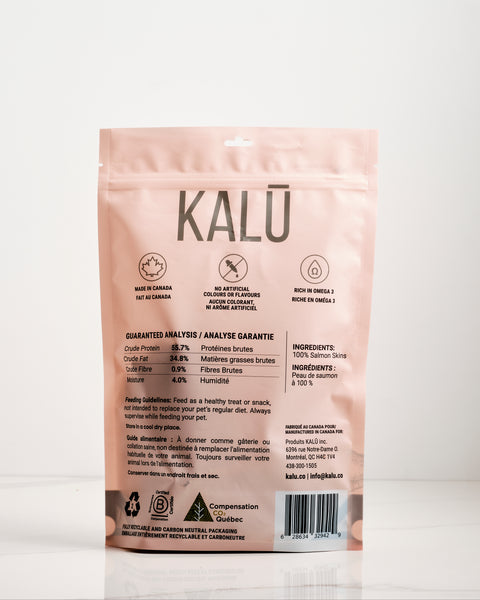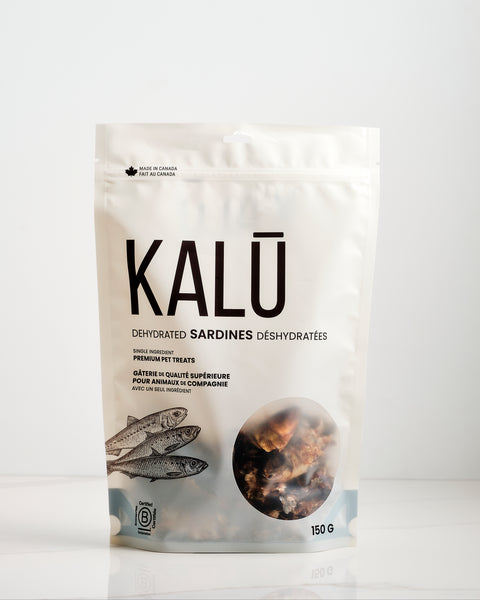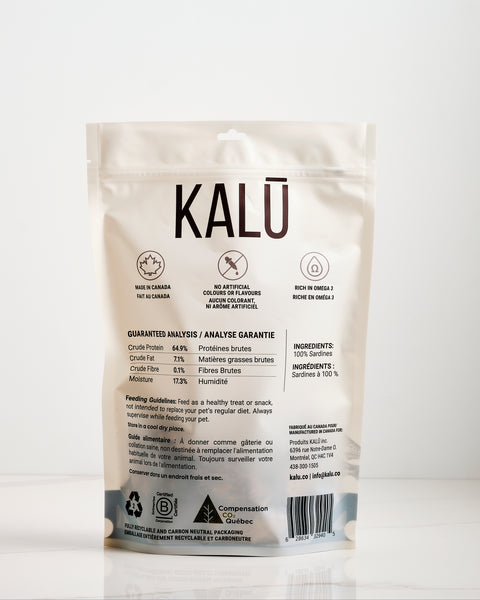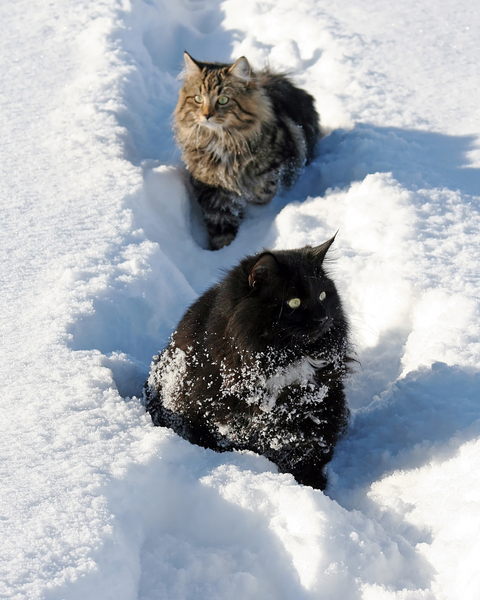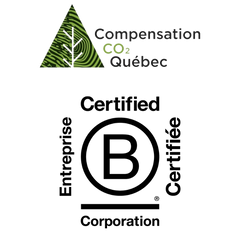Our premium formulas are made with the healthiest ingredients for your pets, dogs and cats. Our products are designed to ensure the health of your animals and allow them to live an active life. Thus, we ensure that all of our formulas contain everything your pet needs for a balanced diet and nothing more! Our recipes contain naturally raised meats, Canadian fish and seafood, legumes, and non-GMO fruits and vegetables.
Discover the benefits associated with each of our ingredients
Salmon Skins
Quebec salmon skin is an excellent source of protein and supports the immune, cognitive, and cardiovascular systems, as well as coat, bones, and joints due to its high omega-3 content. It also contains vitamin D, calcium, phosphorus, and vitamin B12.
Sardines
Canadian sardines provide important vitamins and minerals such as vitamin D, vitamin B12, phosphorus, selenium, and iodine in addition to being very high in protein. They are also among the fish richest in omega-3s yet surprisingly low in fat. Therefore, they have benefits for joint, cognitive, cardiac, and immune health, as well as for the fur and skin of dogs and cats.
Wild Capelin
Wild capelin is a Canadian fish that is very rich in protein and omega-3s. It also contains vitamin D, phosphorus, and selenium, while being very low in fat. It has cardiovascular, joint, immune benefits, as well as benefits for the skin and bones.
Chicken Fat
Chicken fat is an excellent source of fat and omega-6 fatty acids. Chicken fat is often added separately, as chicken meal does not contain a high percentage of fat.
Chicken liver
Chicken liver is a rich source of protein and fat for dogs and cats. Unlike humans, who require large amounts of carbohydrates for their energy needs, your pets rely primarily on fat and protein to meet their metabolism needs. Chicken liver contains high levels of vitamin A and many other minerals (vitamin D, several B vitamins, iron, copper) that help maintain regular body functions.
Chicken meal
Chicken meal provides a concentrated form of protein. Protein is the main component of fur, skin, nails, tendons, ligaments and cartilage.
Egg Powder
Egg powder is a highly digestible source of protein and fat, with 50% protein and 27% fat. Eggs contain one of the most balanced and biologically available sources of protein. This means that your animals can use almost all of the protein in eggs. Egg powder is a dehydrated egg without the shells.
Fish meal
Fish and seafood meal provides a concentrated form of protein. Protein is the main component of fur, skin, nails, tendons, ligaments and cartilage.
Fish oil
Fish oil is an excellent source of fat and omega-3 fatty acids. Omega-3 and omega-6 have been shown to be beneficial for skin and joint health.
Apples
Apples are a source of carbohydrates and fiber. Apples are also a good source of fatty acids, vitamin C, omega-3 and omega-6.
Blueberries
Blueberries are an excellent source of antioxidants, fiber, minerals (manganese) and vitamins (C, E and K). Blueberries are naturally eaten by wolves and are beneficial in the diet of dogs and cats. They increase baseline levels of antioxidants and can help prevent muscle damage in highly active animals.
Carrots
Carrots are an excellent source of carbohydrates and fiber for your pet. Rich in beta-carotene and loaded with potassium and vitamins A, C and K, carrots are beneficial for pets' skin and eyesight.
Cranberries
Cranberries improve your pet's bladder and kidney health. They help reduce the incidence of urinary tract infections by deterring E. coli bacteria from binding to the body, ensuring that they cannot fester and develop into an infection.
Green Peas
Green peas are a vegetable that can be used as a source of carbohydrates (starch) and fiber in pet foods. Although not as digestible as traditional grains, green peas offer many other benefits. One notable advantage of peas is that they produce a reduced glycemic response. This means that once ingested, the typical blood sugar spike associated with traditional carbohydrates is slowed. As a result, green peas and other legumes offer an interesting opportunity in the diet of obese or diabetic animals while remaining an excellent choice for grain-free feeds
Kale
Like spinach, kale is an excellent source of vitamin K. Like all animals, dogs and cats have a metabolic need for vitamin K. The best known function of vitamin K is its role in blood clotting. It is a necessary element in the creation of many clotting factors in liver, bone and kidney tissue.
Pumpkin
Pumpkin is an excellent source of fiber for pets. It helps with digestive health and is rich in beta-carotene (vitamin A). It is also an excellent source of carbohydrates and increases palatability in cats and dogs.
Spinach
Spinach contains a wide range of minerals (including calcium and iron) and is rich in vitamin K. Vitamin K is primarily synthesized by bacteria in the gut of cats and dogs, but adds a beneficial boost when incorporated into the diet. Vitamin K is actively involved in the blood clotting mechanism.
Sweet potatoes
Sweet potatoes are a widely accepted source of carbohydrates and fiber in grain-free diets. It is gluten-free, packed with beta-carotene and has a lower glycemic index than white potatoes. Research has shown that it contains many antioxidant properties as well as vitamins A, C and B6. It is a good source of manganese, copper and iron.
Zucchini
Zucchini is a type of summer squash widely available in the Americas. Zucchini contains a wide range of essential vitamins, minerals and antioxidants, such as vitamins A and C, potassium and manganese. Particularly beneficial in weight loss diets, zucchini has a very low glycemic index that helps maintain low blood sugar levels (especially useful for diabetic animals).
Chamomile
Chamomile is an herb traditionally used as an anti-inflammatory and pain reliever. It has been shown to have properties that improve the appearance of your pet's skin and coat, and promotes dental health by reducing gingivitis.
Dried Rosemary
Rosemary is used as a natural antioxidant and antimicrobial in dog and cat food. It also increases palatability.
Ginger
As in humans, ginger promotes gastrointestinal health in pets, helping with common ailments such as nausea and bloating by helping to move food through the stomach. It is also known as an anti-inflammatory agent.
Kelp
Kelp is rich in natural salts, minerals and vitamins essential for normal body functions. Some of the minerals contained in kelp are iodine, iron, calcium, phosphorus, zinc, magnesium, potassium, copper and selenium; as well as vitamins A, B1, B2, C, D and E. These minerals are essential for the proper functioning of all your pet's major body systems. They help contract muscles, provide skeletal support, transmit signals in the nervous system, improve food absorption, transport proteins and hormones, and maintain water balance.
Peppermint
Peppermint is beneficial for reducing bad breath and relieving indigestion in pets. This means it helps to calm nausea and motion sickness in dogs and cats, as well as reduce flatulence.
Turmeric
The key to turmeric's health benefits lies in a compound called curcumin, a bright yellow compound that makes up 2-6% of turmeric. The spice is known for its anti-inflammatory and healing qualities. Turmeric stimulates immunity and reduces the symptoms of many canine diseases.
Yucca Schidigera Extract
Yucca Schidigera is a conifer that grows in the deserts of North America. We use it in our foods to help increase palatability and reduce fecal odor. It is also an all-natural ingredient that offers anti-arthritic and anti-inflammatory properties.
Celery Seed
Celery seed has been shown to contain a high amount of antioxidants that protect cells from free radical damage. They are also an excellent source of omega-6 fatty acids and research shows that they increase palatability in dogs.
Chickpeas
Chickpeas are an alternative source of plant-based, high-energy carbohydrates and proteins. They are rich in protein (equivalent to soy) and high in dietary fiber. Chickpeas are known to be beneficial for reproductive health and animal development. As a source of vegetable protein, chickpeas have a lower digestibility value (biological value 0.52 to 0.85) than meat-based proteins.
Flaxseed
Flaxseed is a beneficial source of omega-3 fatty acids, fiber, amino acids and vitamins. Omega-3 is known to help promote healthy skin and coat in dogs and cats.
Red Lentils
Red lentils are a healthy source of carbohydrates, protein, fiber and iron. Like peas, red lentils offer a reduced glycemic response compared to many grain-type carbohydrates. This means that once ingested, the typical spike in glucose and insulin levels associated with traditional carbohydrates is slowed. As a result, red lentils and other legumes offer an interesting opportunity in the diet of obese or diabetic animals while remaining an excellent choice for grain-free feeds.
Chondroitin sulfate
Chondroitin is a glucosaminoglycan found in the cartilage of your pet's body. It is often combined with glucosamine to improve joint health and reduce inflammation or pain. It does this by helping to normalize the thickness of the fluid present in the joints and by helping to promote cartilage repair. Therefore, it serves a protective and restorative purpose with long-term use. Pets are known to produce less chondroitin with age, therefore, it is often combined with glucosamine and used as a supplement for older animals. Chondroitin sulfate is a common form of chondroitin used in pet foods. Chondroitin is naturally found in many carbohydrates.
Cobalt sulfate
Cobalt sulfate is a source of cobalt. Cobalt is an integral part of vitamin B12. It is the only known requirement of cobalt for pets. The body cannot synthesize vitamin B12 if the diet does not contain sufficient amounts. Cobalt sulfate is not always a necessary supplement to pet foods if the pet is receiving adequate levels of vitamin B12 from other ingredients in the diet. It is sometimes added in small amounts to ensure that there is always enough cobalt for the body to produce vitamin B12.
Copper sulfate
Copper sulfate is a source of the mineral copper salt. The role of copper is closely related to that of iron in your pet's body. Copper is necessary for the absorption and transport of ingested iron and is essential for the proper functioning of hemoglobin (see Ferrous Sulfate for the role of iron and hemoglobin). Copper is also important for skeletal development and is a necessary component of some antioxidants. Naturally, it is found in high concentrations in organ meats.
Dried brewer's yeast
Dried brewer's yeast is a form of yeast (Saccharomyces cervisiae) that has been used in the brewing process of beer. Brewing "kills" the yeast fungus cells, so they are no longer alive when used as an ingredient in animal feed. Nutritionally, it is a beneficial supplement when included in the diet of dogs, felines and humans. It has a high percentage of protein, as well as essential fatty acids, B-complex vitamins (B1, B2, B3, B5, B6, B7, B9) and the minerals Chromium and Selenium. Like inactivated yeast (see below), this high level of B vitamins can help promote a healthy skin and coat, while increasing the palatability of food.
Additional Information: Rumor has it that dried brewer's yeast is a repellent for fleas, mosquitoes and ticks. Despite the many other health benefits of this ingredient, this is unfortunately an urban myth that has been disproved by scientific research.
Ferrous sulfate
Ferrous sulfate is a commonly used source of iron. Iron plays an important role in hemoglobin (> 65% of stored iron) and in myoglobin cells. Hemoglobin is a protein in red blood cells that binds oxygen from the lungs and transports it throughout the body. Myoglobin binds oxygen for immediate use by muscle cells. Iron is a micromineral, which means that it is needed in the body in very small amounts.
Inactivated Yeast
Yeast is a single-celled cultivated fungus that is rich in protein, contains a wide range of amino acids, minerals (chromium and selenium) and a high concentration of B vitamins. Since B vitamins are linked to coat condition, inactivated yeast helps promote a healthy skin and coat while increasing feed palatability.
Selenium yeast
Selenium yeast is a source of selenium. The form of selenium produced by yeast is known as "selenomethionine". In humans, this source has been shown to be better tolerated by the body and more closely resembles the form found in fresh foods, making it more biologically available than selenium salts. Selenium occurs naturally in grains, yeast, meat and fish and is an integral part of the antioxidant compounds that protect cell membranes from oxidative damage.
Manganese sulfate
Manganese is an important mineral for skeletal development and reproductive health. It is also found in many enzymes in the body. Manganese sulfate is commonly found in pet foods as a source of manganese. It is readily found in vegetables and whole grains and in smaller amounts in poultry and fish.
Zinc sulfate
Zinc sulfate is the salt form of zinc. Zinc is the second most abundant trace element in the body, after iron. It is an essential mineral that animals must obtain from their diet. Zinc is present in most tissues of the body and plays an important role in proper immune function, wound healing, protein and DNA synthesis, cell division and normal reproductive function. Zinc also supports the normal growth and development of your dog or cat.
Copper lysine
Copper lysine is a source of the mineral copper and the amino acid lysine. Lysine is an essential amino acid for dogs and cats. The demand for lysine in the diet increases as the amount of protein ingested increases.
Manganese methionine
Manganese is an important mineral for skeletal development and reproductive health. It is also found in many enzymes in the body. Methionine is an amino acid that is considered an organic supplier of sulfur to the body. It is important in the development of another amino acid, cysteine.
Cats have a higher requirement for methionine (and cysteine) than dogs. Methionine is also a component of the essential amino acid, taurine. Cats cannot synthesize their own taurine, so a good inclusion of methionine is an important component of cat food.
Manganese proteinate
Manganese proteinate is a chelated form of the mineral manganese. Manganese is important for skeletal development and reproductive health. It is also found in many enzymes in the body.
Salt
Salt, also known as sodium chloride, is important for the proper growth and development of your pet. Once ingested, the body breaks it down into its two components: sodium and chloride. Sodium and chloride are used to transport nutrients through the cell walls, while preventing your pet's body fluids from becoming too acidic or basic. The body also uses chloride to make hydrochloric acid, which is used by the stomach to digest food.
Unlike humans where a high salt diet can lead to hypertension and increased blood pressure, pets are able to rid their bodies of excess salt in a way that humans cannot. Dogs and cats continually lose salt through the urinary system and use this mechanism to optimally balance salt levels in their bodies. As a result, they do not suffer from the same salt-related health problems as humans. Although many ingredients naturally contain salt, it can be beneficial to add a small mineral salt component to a pet's diet to ensure adequate sodium and chloride levels.
Biotin
Biotin is a vitamin that transports carbon dioxide used to create both fatty acids and amino acids. Biotin is naturally found in cooked eggs, liver, milk, vegetables, nuts, corn, meat and bone meal. Bacteria in the gut can produce biotin. It is thought that these bacteria may contribute to a certain proportion of the body's biotin requirements.
L-Ascorbyl-2-Polyphosphate
L-Ascorbyl-2-Polyphosphate is a natural source of vitamin C. Vitamin C is important for normal bone and connective tissue formation, acts as an antioxidant and plays a role in the immune function of pets. Unlike humans who require a dietary source of vitamin C, dogs and cats can synthesize their own vitamin C in their liver.
Niacin
Niacin is a vitamin also known as nicotinic acid. It is involved in the transfer of hydrogen atoms between molecules to increase or decrease their stability. Niacin is important for the breakdown of fats, carbohydrates and proteins. Niacin is naturally present in meat, vegetables and grains. Dogs can synthesize small amounts of niacin in their bodies; cats cannot and must acquire all their niacin from their diet.
Pyridoxine Hydrochloride
Pyridoxine hydrochloride is a water-soluble vitamin that serves many roles in your pet's body. Primarily, it is involved in the breakdown of food to help produce energy. Therefore, its main role is to break down amino acid chains, but it is also involved in the metabolism of glucose and fatty acids. It is also important in the production of hemoglobin and the production of vitamin niacin. Pyridoxine hydrochloride is a commonly used source of vitamins in pet foods, but is found naturally in animal tissues, fish, wheat germ and whole grains. Pyridoxine requirements are directly related to protein intake. As protein intake increases, the need for pyridoxine to break down amino acid chains also increases.
Riboflavin
Riboflavin is an important vitamin in the release of energy from carbohydrates, fats and proteins. Microbes in the large intestine of pets can synthesize riboflavin, although it is not certain that they can produce enough to meet your pet's needs. As a result, riboflavin is often added to pet foods to ensure adequate intake. Riboflavin is commonly found in milk, organ meats, whole grains and vegetables.
Vitamin A
Vitamin A is crucial for vision, bone development, reproduction and skin and coat maintenance. At the base of these compounds are carotenoids, which are created by plant cells (think carrots, sweet potatoes and vision) and then ingested by animals. It is in the animals' gut that vitamin A is created and then stored. Dogs can make their own vitamin A from carotenoids, but cats cannot. Cats cannot create their own vitamin A and must obtain it from the diet. Natural sources of vitamin A for cats include fatty meats, eggs and dairy products.
Vitamin B12
Vitamin B12, also known as cobalamin, can only be synthesized by microorganisms and is the only vitamin that contains a trace element: cobalt. It is essential in many biochemical reactions in the body and is important in the metabolism of carbohydrates and fats. It is naturally found in foods of animal origin, mainly meat, poultry, fish and dairy products.
Vitamin D3
Vitamin D3 is the "pro-vitamin" form of vitamin D, the same vitamin that humans get from the sun. With their thick coat of fur, dogs and cats need to consume it in their diet in order to get it into their bodies. Also known as cholecalciferol, it is of great nutritional importance to omnivores and carnivores. It is a compound that regulates the way calcium and phosphorus are used in the body. Thus, it is crucial for the normal development and maintenance of bone tissue. This vitamin is generally found in high concentrations in cod liver oil and in moderate amounts in egg yolk, liver and fish.
Vitamin E
Vitamin E is the term used for a variety of closely related compounds called "tocopherols". The main role of vitamin E in the body is to be a powerful antioxidant by protecting tissues and fats from becoming free radicals. Vitamin E also plays a role in the formation of cell membranes, cellular respiration and in the metabolism of fats. It is essential to keep the cells of these organs alive and functional.
Vitamin E is also used as a natural preservative for chicken fat and fish oil. This is why you sometimes see the words "Preserved with mixed tocopherols, a form of vitamin E" after these ingredients in ingredient lists. This is because vitamin E acts as a natural antioxidant (preservative) in fat-based ingredients, just as it does in your pets' bodies.
Calcium carbonate
Calcium carbonate comes from natural sources. The calcium found in limestone is readily available to supplement pet food. Calcium is a vital nutrient for the growth and health of pets. It is a primary structural component of bones and teeth, facilitates blood-protein clotting, serves as a key conductor of nerve signals, initiates muscle contractions, activates certain physiological enzymes and buffers pH changes.
Choline chloride
Choline chloride is a commonly used food source of the vitamin choline. Choline plays 3 important roles in the body: 1- it provides a structural element in cell and protein membranes, 2- it removes excess fat from the liver 3- it can easily be used to help make other amino acids. Your pet's body can synthesize choline, but it can help prevent problems associated with fatty liver build-up if used as a dietary supplement.
Calcium hydrogen phosphate
Calcium hydrogen phosphate is a source of minerals, calcium and phosphorus, readily available to dogs and cats.
Calcium iodate
Calcium iodate is a source of iodine. Iodine is necessary for the proper functioning of the thyroid gland and the production of thyroid hormones. Thyroid hormones regulate the rate of metabolism in the body and play an important role in normal growth.
Calcium pantothenate
Calcium pantothenate is the pure form of the vitamin pantothenic acid. "Pantos" is the Greek word for "all", it is aptly named, as pantothenic acid is present in all body tissues and all forms of living tissue. It plays an essential role in the metabolism of carbohydrates, fats and proteins. It is a vitamin that is readily found in many food ingredients (meat, dairy, eggs, vegetables), but is often added as a supplement to the diet to ensure that the animal receives the optimal amount.
Calcium propanoate
Calcium propanoate is a mold inhibitor (antimicrobial) often used in human and pet foods. Calcium propanoate is considered a stable preservative and rarely dissociates from its salt (calcium), it is a preservative of choice for low acid foods. Calcium propanoate is certified for the human food market, which means that there are more extensive research and practices behind the use of the product.
Chicory Root
Chicory root is an excellent source of inulin, a prebiotic, and can also be used as a source of carbohydrates. Consumption of chicory also benefits the immune system and digestive system. Chicory root contains approximately 55% inulin. Pets should not exceed 1 to 3% chicory in their diet.
Copper proteinate
Copper proteinate is a chelated source of copper. The role of copper is closely related to that of iron in your pet's body. Copper is necessary for the absorption and transport of ingested iron and is essential for the proper functioning of hemoglobin (see Ferrous Sulfate for the role of iron and hemoglobin). Copper is also important for skeletal development and is a necessary component of some antioxidants. Naturally, it is found in high concentrations in organ meats.
DL-Methionine
DL-Methionine is an essential amino acid supplement. Methionine is usually the first limiting amino acid in most pet foods, it is synthesized into other amino acids such as cysteine, taurine and in cats it is converted into felinine. Methionine improves liver health and, through its synthesis into taurine, plays an important role in gastric acid production, eye health, normal heart function and reproductive success in dogs and cats. As a supplement, it can also be used to help acidify the urine of cats to reduce the risk of struvite stones developing in the kidneys.
Folic acid
Folic acid is a transport molecule in the body. It helps minerals bind and allows them to react with other molecules and enzymes. It plays a crucial role in DNA synthesis. A shortage of folic acid leads to a deficiency in DNA, resulting in decreased cell growth and maturation. Folic acid can be synthesized by the intestinal bacteria of dogs and cats, or it can be acquired through a diet that includes organ meats and green leafy vegetables.
Glucosamine hydrochloride
Glucosamine is an amino acid sugar found in the extracellular matrix of joints. It is considered a "neutraceutical", a compound that helps regenerate and protect the connective tissue/cartilage of your pets' joints. As a result, it is thought to be extremely beneficial for pets suffering from arthritis and joint pain.
Glucosamine hydrochloride is a salt form of glucosamine. It is known to have protective and reparative properties, especially when combined with chondroitin. These properties include reduced inflammation, increased cartilage repair and good joint lubrication. Better joint health means better mobility for a more active and happy pet.
Lecithin
Lecithin is a molecule that plays an important structural and functional role in cell membranes. In pet foods, it is known to aid in the digestion, absorption and transport of fats across cell membranes.
L-Lysine monohydrochloride
L-Lysine Monohydrochloride is a digestible salt version of the amino acid, lysine. Lysine is an essential amino acid for dogs and cats, which means they must get it from their diet. Research suggests that the need for Lysine in the diet increases as the protein content increases.
Potassium chloride
Potassium chloride is a salt of potassium, making it a source of potassium. Potassium is important in the body as it helps maintain proper hydration in the cells, is vital in enzyme reactions and is needed to transmit nerve signals for muscle movement and contraction, making it a very important mineral for the heart. A potassium supplement is a common ingredient in pet foods to ensure proper nutrition in dogs and cats.
Selenium Selenite
Sodium selenite is a source of selenium. Selenium is naturally found in grains, yeast, meat and fish and is an integral part of the antioxidant compounds that protect cell membranes from oxidative damage.
Additional information: There appears to be some controversy over the use of sodium selenite to provide trace amounts of selenium in a dog food. Opponents of sodium selenite - or its close chemical cousin, sodium selenate - are concerned about what they believe is a particularly thin margin of safety between an effective "dose" of the mineral and the amount that could cause toxicity. Thus, a supplement supplier who provides a little too much selenium to a commercial nutrient blend could allow a dog owner to unknowingly administer a toxic dose to his or her pet over an extended period of time. This rumor has historical merit dating back to the mid 1900's when there were a few incidents of mineral suppliers administering too much selenium to a premix, resulting in toxicity in a small number of dogs. Thanks to advances in science and technology, there have been no incidents of death from sodium selenite overdose since then. Yet, despite decades of safe administration of sodium selenite in pet foods, the unfounded controversy still persists.
Taurine
Taurine is an amino acid involved in many aspects of the body. It is involved in the breakdown of food, creation of stomach acid, eye health and normal heart function. It also plays an essential role in the reproductive health of cats and dogs. Unlike most mammals, it is an essential amino acid in cats, as they are unable to produce it on their own. Taurine is easily found in fish, poultry and rodents. It is found in high concentrations in algae.
Thiamine mononitrate
Thiamine is a component of the coenzyme thiamine pyrophosphate. It plays an important role in the breakdown of carbohydrates into energy and helps convert carbohydrates into lipids. It also plays a role in the breakdown of fatty acids, nucleic acids, steroids and some amino acids. It is necessary for the proper functioning of the nervous system. Thiamine mononitrate is a common form of this vitamin found in pet foods. Thiamine is naturally found in beef, liver, pork, wheat germ, whole grains and vegetables.
Zinc methionine
Zinc methionine is a zinc atom bound to the amino acid, methionine. When metal ions are bound to an organic material, they are commonly called a "chelated" mineral. This means that it is a more natural and readily available form of the mineral. Zinc is the second most abundant trace mineral in the body, after iron. It is essential for animals to get it in their diet. Zinc is present in most tissues of the body and plays an important role in proper immune function, wound healing, protein and DNA synthesis, cell division and normal reproductive function. Zinc also supports the normal growth and development of your dog or cat.
In addition to being an amino acid, methionine is considered an organic supplier of sulfur to the body and is essential for the body to create another amino acid, cysteine. Cats have a higher need for methionine and cysteine than dogs, as cysteine is a precursor to the development of taurine, another essential amino acid that cats must obtain from their diet.

